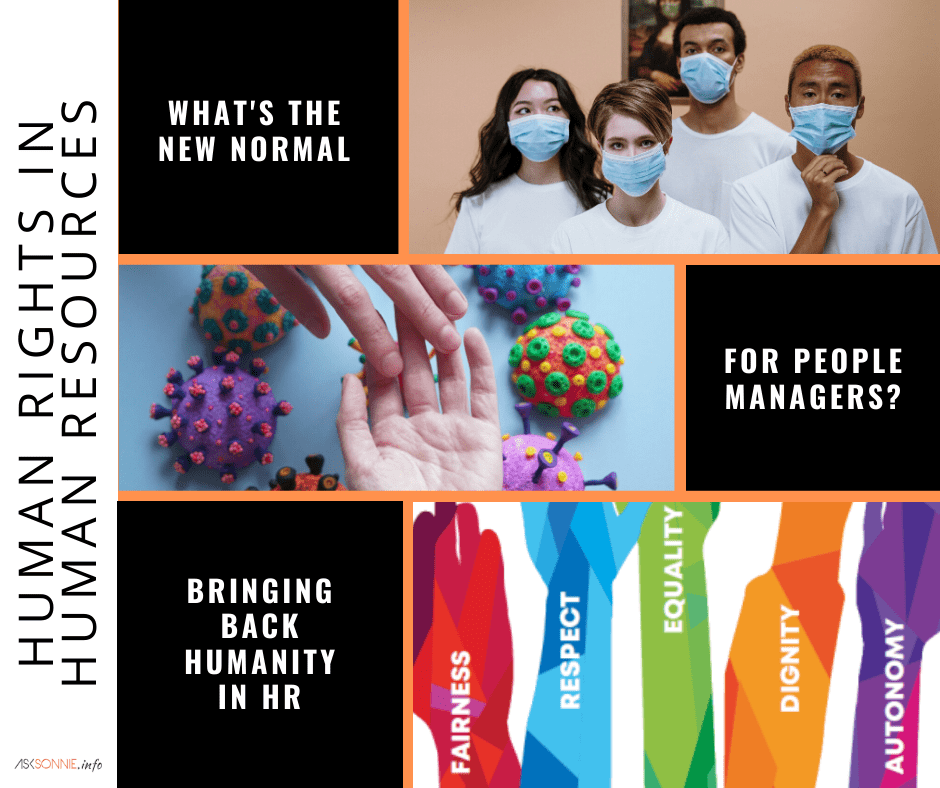Human rights in human resources (#HRinHR) is what it takes to bring social justice to the workplace. It’s not political, it’s just being humane.
this article was updated to apply #HRinHR in the present COVID-19 situation, where the off-boarding process becomes less humane.

Because of the pandemic, both employees and employers were financially affected. And when survival is at stake, we tend to become too transactional in our process when reducing salary, temporary lay-offs, and retrenchment of employees. These translate a challenging situation to a super difficult and heartless one.
Thus, we take this opportunity to remind all stakeholders of the likely benefits of #HRinHR, or human-centered management, when observed. What are these:
Effective DEI Program
An effective DEI program had its core foundation on the socio-economic-cultural human rights in organizational interventions. This will shape the core values, mindset, culture, and processes of the organization. These rights will directly impact the “inclusion” aspects of DEI, as they will foster fair allocation of resources, leadership accountability, elimination of both environmental and behavioral microaggressions, and a culture of belonging.
Less trouble with regulatory bodies
When an organization complies with the minimum requirements of the law—in this case, the human rights of employees—then they will have less trouble with our regulatory bodies.
More than any CSR initiative, employees should be the priority and primary responsibility of any company. Needless to say, employee welfare is the first and foremost obligation of companies to society.
Attract and retain good talents
A recent study commissioned by Jobstreet, re: laws of attraction, points to one of the gripes of Filipino employees are companies who are not socially responsible (non-compliance to the minimum standards of the law and/or no CSR program).
Customer trust
If a business properly respects human rights, then in all likelihood, it will be more profitable – Richard Karmel, Partner at Mazars
59% of US consumers surveyed saith they’d be less likely to buy from a company if they knew they have suffered a data breach (Deloitee, 2015)
Only 25% of US Consumers believe most companies handle their sensitive personal data responsibly. Yet 72% believe businesses, not the government, are best equipped to protect them. (PricewaterhouseCoopers, 2018)
Observing human rights in business is a social investment, the return of investments is a high trust rating from customers.
Growth opportunities
If a company wants to enter into partnerships or seeks new investors, trustworthiness, good reputation, and compliance with the law will come in handy. A high trust rating from customers, an employer of choice in the job market, and compliance with national and international laws will likely result in growth opportunities.
It is common knowledge that companies wanting to do business with multinational clients will likely lead to careful scrutiny, especially those from companies that have a presence in the US and European countries.
Add to that, there are investors representing 5.3B USD who are supportive of the UN guiding principles of business and human rights.
HR in HR or Human Rights in Human Resources is an organization intervention with the following end in mind:
1. To integrate a rights-based approach in corporate strategic policies, people management, and culture development.
2. To promote good corporate citizenship by identifying and correcting management practices that may affect the human rights of employees (internal due diligence process).
3. To promote greater social good by ensuring community programs of the organization reduce social injustice (external due diligence process) and
4. To inculcate a culture where human dignity is respected in the workplace.
To illustrate the need for HR in HR, allow me to share this story:
A company outsourced its medical services to an independent clinic operator. One of the items they agreed upon is “no employee can be brought to a hospital without a family member or companion”.
So one day, an employee went to this clinic and sought medical help because of elevated BP. The employee requested to be brought to the hospital but the clinic invoked the agreement. The clinic though, advised operations that an employee needs to be brought to a hospital, needing a companion. But everyone is busy and leaving their workstation can affect the performance matrix.
The manager of the employee was off duty and already at home. Since none can or is willing to accompany the employee, he went back to the office to bring the employee to the hospital.
As a result of the delay, the concerned employee is now under life support for multiple ruptures of veins.
Can you think of a better way to handle the situation above?
Likewise, below are two money-related examples that can be disrespectful to human dignity.
Final pay– When final pay, clearance, and COE takes more than 30 days to be released to employees.
Wrong salary computation by payroll or timekeeper– waiting for the next cut-off to receive employees’ money that was wrongfully withheld because of someone else’s mistake.
Examples of human rights in human resources in action
The right to take a break
The stresses of work and fear of COVID 19 infection have taken a toll on many employees, under Art 24, employees have the right to leisure and rest. Employers should discourage employees to work on rest days and more than the agreed daily work hours.
Likewise, under Article 4 of the UDHR, involuntary servitude is prohibited.
“When employers have not complied with the minimum health and safety requirements prescribed by the government, forcing employees to return to onsite work may be construed as involuntary servitude. Likewise, unless the employee is under administrative investigation or did not follow existing guidelines, refusal to approve or accept notice of resignation and/or application of leaves might also be construed as involuntary servitude”.
The right to speak their mind
Having regular town hall meetings is one of the many ways to engage employees. When employees were consulted or felt they were part of the decision-making process, it increases employee morale and a sense of belongingness. When we encourage employees to speak their minds, we uphold article 19 of UDHR.
The right to a safe and secure workplace
Over complying with the minimum occupational health and safety standards of the government encourages employees to report to onsite work, despite the pandemic or other natural disasters. Likewise, by promoting a less toxic culture, you are promoting mental wellness. These are inconsistent with Article 25 of the UDHR.
Recognizing the humanity in business and people operations can lead to better employee engagement, leading to better productivity. Improved productivity translates to a better bottom line
Do you have a story in mind that respects human rights in human resources? Share in our comments section below to promote human-centered management





